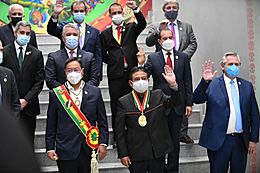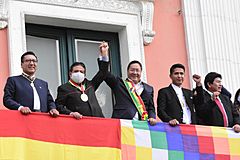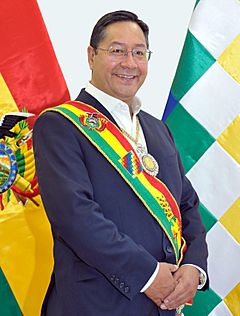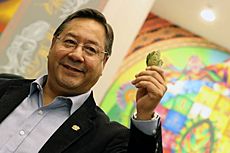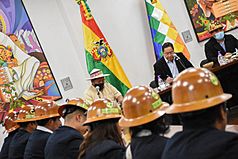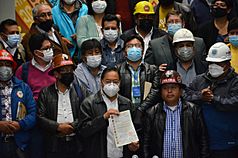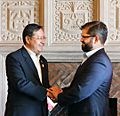Luis Arce facts for kids
Quick facts for kids
The Most Excellent
Luis Arce
|
|
|---|---|
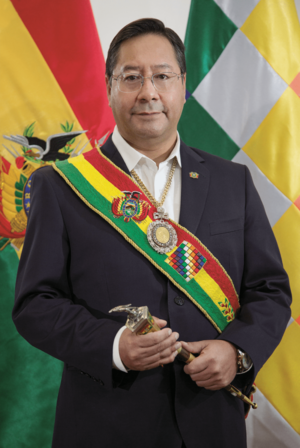
Official portrait, 2020
|
|
| 67th President of Bolivia | |
| Assumed office 8 November 2020 |
|
| Vice President | David Choquehuanca |
| Preceded by | Jeanine Áñez |
| Minister of Economy and Public Finance | |
| In office 23 January 2019 – 10 November 2019 |
|
| President | Evo Morales |
| Preceded by | Mario Guillén |
| Succeeded by | José Luis Parada |
| In office 8 February 2009 – 24 June 2017 |
|
| President | Evo Morales |
| Preceded by | Himself (as Minister of Finance) |
| Succeeded by | Mario Guillén |
| Minister of Finance | |
| In office 23 January 2006 – 8 February 2009 |
|
| President | Evo Morales |
| Preceded by | Waldo Gutiérrez Iriarte |
| Succeeded by | Himself (as Minister of Economy and Public Finance) |
| Personal details | |
| Born |
Luis Alberto Arce Catacora
28 September 1963 La Paz, Bolivia |
| Political party | Movement for Socialism (not recognised by a faction) |
| Other political affiliations |
Socialist Party-1 |
| Spouses |
Jéssica Mosqueira
(divorced)
|
| Children | 3 |
| Parents | Carlos Arce Olga Catacora |
| Education | Mexico School Institute of Banking Education |
| Alma mater | Higher University of San Andrés (BEc) University of Warwick (MEconSc) |
| Occupation |
|
| Signature |  |
Luis Alberto Arce Catacora (born 28 September 1963), often called Lucho, is a Bolivian banker, economist, and politician. He has been the 67th president of Bolivia since 2020. Before becoming president, he was the Minister of Finance and later the Minister of Economy and Public Finance from 2006 to 2017, and again in 2019. He is a member of the Movement for Socialism political party.
Contents
Early Life and Education
Luis Alberto Arce Catacora was born in La Paz, Bolivia, on 28 September 1963. His parents, Carlos Arce Gonzales and Olga Catacora, were both teachers. Luis grew up in a middle-class family.
He finished high school in La Paz in 1980. He first studied at the Institute of Banking Education in La Paz, becoming an accountant in 1984. In 1991, he earned a bachelor's degree in economics from the Higher University of San Andrés. He then continued his studies in the United Kingdom at the University of Warwick, where he received a master's degree in economics in 1997. He also has special honorary degrees from two universities in Bolivia.
Career as a Public Official
Arce spent most of his career working for the government. He started at the Central Bank of Bolivia in 1987. From 1992 to 2005, he worked in the bank's International Operations Management. He also taught at various universities in Bolivia. He has given talks at famous universities around the world, including Columbia University and Harvard University.
Minister of Economy
On 23 January 2006, President Evo Morales chose Arce to be the Minister of Finance. Three years later, he became the head of the new Ministry of Economy and Public Finance. Many in Bolivia saw Arce as the key person behind Bolivia's strong economic growth.
He helped the government take control of important industries like oil, gas, telecommunications, and mining. He also helped create BancoSur, a bank for South American countries. Under his leadership, Bolivia's economy grew significantly, and extreme poverty was greatly reduced.
In 2011, a magazine called American Economy ranked Arce as one of the best economy ministers in the region. Experts noted that Arce was a calm and sensible leader who avoided strong political talk. He was praised for helping Bolivia's economy grow and for lowering the poverty rate, especially because of more gas exports.
In June 2017, Arce had to leave his job to get surgery for kidney cancer in Brazil. After recovering, he returned to his role as Minister of Economy on 23 January 2019.
Leaving Office in 2019
In late 2019, Bolivia faced many protests and demonstrations. These events were caused by concerns about the presidential election results. During this time, Arce had to announce that the government would temporarily stop some social benefits, like pensions and school vouchers. This was due to ongoing strikes and blockades.
He resigned on 10 November, saying it was to help calm the country. President Morales also resigned a few hours later. After resigning, Arce found safety at the Mexican Embassy in La Paz. He later traveled to Mexico, joining other officials who had left Bolivia.
Presidency (2020–present)
Evo Morales chose Luis Arce to be the presidential candidate for the Movement for Socialism party in the 2020 Bolivian general election. Arce won the election with 55% of the votes.
Arce became the 67th president of Bolivia on 8 November 2020. In his first speech, he promised to fight the pandemic and fix the country's economy. He also said he would "govern with inclusion" and hoped to be remembered for bringing back hope and fairness to society.
Domestic Policies
Responding to COVID-19
On 30 December 2020, Arce's government made a deal with Russia to get 5.2 million doses of the Sputnik V vaccine. This was enough to vaccinate 2.6 million people. The first vaccines arrived in January 2021.
Arce initially said he would be the last person to get vaccinated. However, he received his first dose on 24 May to encourage others to get vaccinated. He got his second dose in October, again urging Bolivians to get their shots.
To increase vaccinations, Arce introduced a rule in December 2021. It required people to show proof of vaccination or a negative test to enter many public places. This rule quickly boosted vaccination numbers. However, some groups protested, and the government later removed the requirement.
Cultural Changes
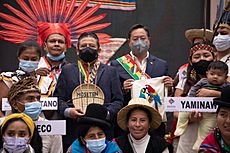
As president, Arce brought back the Wiphala flag, which represents the indigenous peoples of the Andes, to the presidential sash. The previous government had removed it. However, Arce also faced criticism for removing the flag of the Patujú flower, which represents eastern indigenous peoples, from official government events.
When he formed his new government in November 2020, Arce promised to bring back the Ministry of Cultures. This ministry had been closed by the previous government. The new ministry, called the Ministry of Cultures, Decolonization, and Depatriarchalization, was created on 13 November.
In January 2021, Arce made the Chakana cross the official government logo. This cross has twenty-four designs that represent different textile patterns from Bolivia's regions. Arce said this new logo helps show "the identity of each Bolivian" and helps the country move forward as one.
Economic Policies
To help people during the pandemic and boost the economy, Arce started a "Bonus against Hunger" program. It gave Bs1,000 (about US$143) to around four million unemployed Bolivians. This program was funded by loans from the World Bank and the Inter-American Development Bank.
In December 2020, Arce also introduced a yearly wealth tax on very rich people. This tax applies to those with personal wealth over US$4.3 million. The government expected to collect a certain amount, but it actually collected much more than planned.
In February 2021, Arce ordered the Central Bank to return a US$327 million loan from the International Monetary Fund (IMF). This loan had been given to the previous government to help with the economic crisis.
By the end of 2021, Arce's economic plans had helped Bolivia's GDP grow by 9.4%. This reversed a big drop from the year before. In January 2022, Arce proudly announced that Bolivia had one of the fastest-growing economies in the region. He also noted that Bolivia had the lowest inflation rate in South America. For the first time in seven years, Bolivia sold more goods to other countries than it bought, creating a trade surplus. The gap between rich and poor also became the smallest in the country's history.
In April 2022, Arce worked with the Bolivian Workers' Center (COB) to discuss raising workers' wages. They agreed to increase the minimum wage by four percent. Workers in health and education received a three percent salary increase. Arce signed this wage increase into law on 1 May, which is Labor Day. He also signed laws giving workers paid time off for family deaths, marriage, or birthdays.
National Security
Arce's government also took steps to fight terrorism and its funding, as requested by the United Nations. In July 2021, Arce proposed a new law against illegal profits and funding for terrorism.
However, this proposed law caused protests from opposition groups. They worried it would give the government too much power to investigate people and lead to political persecution. Many people protested, blocking roads in major cities. Arce said these protests were an attempt to overthrow the government. Due to the widespread opposition, Arce decided to withdraw the bill. His minister promised the law would not be brought back during Arce's time in office.
Foreign Policy
Arce's foreign policy aimed to bring Bolivia back to its earlier relationships with other countries. As one of his first actions, Arce restored diplomatic ties with Iran and recognized Nicolás Maduro as the leader of Venezuela. The previous government had not recognized Maduro.
In November 2020, Arce announced that Bolivia would rejoin the Bolivarian Alliance for the Peoples of Our America (ALBA), the Community of Latin American and Caribbean States (CELAC), and the Union of South American Nations (UNASUR). Arce said that CELAC was the "best way" to unite Latin American countries. He also called for UNASUR to be strengthened again.
2024 Coup Attempt
On 26 June 2024, soldiers entered the Bolivian Presidential Palace in La Paz. This happened after the commanding general of the Bolivian Army was removed from his position by Arce. It appeared to be an attempt to take over the government.
Personal Life
Luis Arce was married to Jéssica Mosqueira, and they have three children: Luis Marcelo, Rafael Ernesto, and Camila Daniela. His current wife is Lourdes Brigida Durán Romero. She is the first First Lady of Bolivia since 2006. Arce can speak English and Portuguese.
Electoral History
| Year | Office | Party | Votes | Result | Ref. | |||
|---|---|---|---|---|---|---|---|---|
| Total | % | P. | ||||||
| 2020 | President | Movement for Socialism | 3,393,978 | 55.10% | 1st | Won | ||
| Source: Plurinational Electoral Organ | Electoral Atlas | ||||||||
Images for kids
See also
 In Spanish: Luis Arce para niños
In Spanish: Luis Arce para niños


